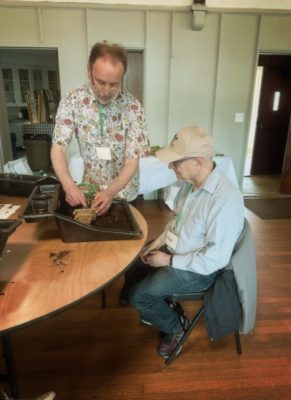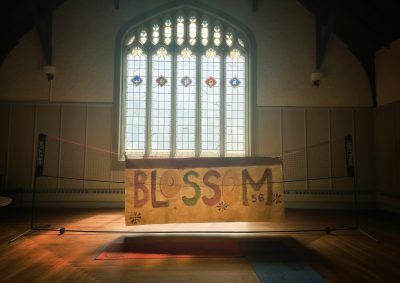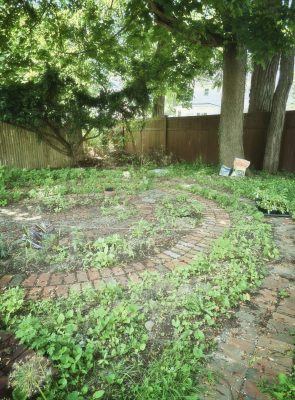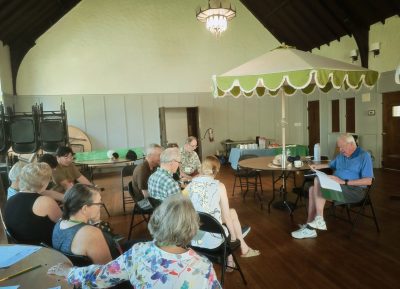‘She Would Even Smile’: Pleasantville Horticultural Haven Uplifts Dementia Community
News Based on facts, either observed and verified directly by the reporter, or reported and verified from knowledgeable sources.

By Toby Rosewater
As a little boy, Fred Ellman accompanied his sick grandmother to the Brooklyn Botanic Garden. In her early 50s, she was already struggling with dementia.
“They called it hardening of the arteries,” Ellman said.
The garden was an oasis of green in a city of gray. It was well worth the 10-cent entry fee.
“She didn’t talk, but the garden got through to her,” Ellman said, pointing to his heart. “She would even smile.”
It was there, at just seven years old, that Ellman first developed his love for the natural world. Over the next 61 years, a great deal would change. Ellman became a toy maker and an architect, met his wife, had kids, and designed the Children’s Museum of Manhattan, but all along, his love for nature, first nurtured in that quiet urban garden, never left him.
“It is my passion,” he told me.
The Blossom Respite
Of all the places Ellman’s journey could have led him, it has brought him to St. John’s Episcopal Church in Pleasantville.
Two months ago, in partnership with St. John’s Rev. Chris Veillon and the Respite for All Foundation, Ellman established the Blossom Respite Cafe and Gardens, a horticultural day program for people with dementia.
Among other activities, participants engage in gardening, crafts, percussion, singing, and sports, spending around 40 minutes at each station and 30 minutes outside.
The four-hour program, which I attended in late June, costs $50 to $75 per day and is held every Tuesday and Wednesday from 10 a.m. to 2 p.m.
In Westchester, where over 23,000 residents aged 65 and older have Alzheimer’s, the resource is invaluable.
“I think it’s great,” explained Ronnie Siegel, the spouse of Merrill Halpern, a participant. “It’s something that the county is totally lacking…so this really fills a gap.”

A Local Oasis

The event space itself offers its own kind of sanctuary. At its center stands a tall, Gothic-arched window. In the morning, sunlight streams through the portal, illuminating splashes of color from the stained-glass medallions and filling the room with a gentle, uplifting light.
“It’s a great window,” Ellman said. “And the space is just wonderful.”
Even so, the group often moves outside, preferably to the meditation spiral.
“It is a spiral, though, since we built it by hand, it’s not exactly perfect. I like to call it the ‘cinnamon roll,’” Ellman laughed. “Humor is a big part of working with dementia.”
The hand-built spiral, made of bricks salvaged from a local Girl Scout building, brings color, texture, and playfulness to the garden space.
“It’s filled with different plants,” Ellman said. “We’re going to add even more, I know that.”
Philosophy
Ellman’s approach is guided by more than just personal experience. In addition to being a trained architect, Ellman is also a horticultural therapist. When he’s not at St. John’s, he teaches at the Botanical Garden in the Bronx.
“I teach people how to work with dementia…I show movies, I show films, we do it all,” Ellman said.
His teaching, and the underlying philosophy behind the Blossom Respite, conjure a concept called “Biophilia,” first coined by naturalist Edward Wilson in the early 1980s.
The paradigm, as Wilson describes it, refers to our innate attraction to the natural world, encompassing both plants and animals.
“There are a lot of theories about why we’re drawn to nature,” Ellman said. “Some say it’s rooted in survival, something deep in our DNA. We’re drawn to things that are vibrant and alive, and that inherent beauty, just the naturalness of it all, makes us feel alive, no matter who we are.”
A Caring Community
Regardless, the Blossom Respite is nothing without its volunteers.
Lunchtime is organized by the Nicholas Center, which specializes in teaching life skills to adults with Autism Spectrum Disorder.
“Even today, there is somewhat of a stigma around what individuals with autism can and can’t do,” Linda Seay, a community director at the Nicholas Center, said. “But the fact of the matter is, yes, they can…and they’re demonstrating that here, today.”
Moments like these reveal the extent to which the heart of Blossom Respite lies not within its programming or building, but in the dedication and spirit of its volunteers.
Near the tail end of my visit, I ran into Candace Martin. In 2023, Martin was diagnosed with a rare and aggressive form of non-Hodgkin lymphoma.
She still recalls the moment something went wrong: “I was watching my son play hockey, and everybody on the ice went double. Honestly, I didn’t know what was happening.”
Today, Martin is in remission, searching for purpose, and volunteering at the Blossom Respite.
“It’s hard to be a survivor,” she said. “But I’m getting through it…I can’t work…so I’m trying to help others.”
Indeed, as I wrapped up my interview with Ellman, two hours past closing, Martin came back to help tidy up.
“She just came back,” Ellman marveled, shaking his head with a grin. “I said to her, ‘Are you out of your mind? In this heat?’ But that’s Candace. That tells you everything, doesn’t it?”
The Future
In many ways, the Blossom Respite feels like a culmination of Ellman’s life’s work.
“My wife said to me, ‘Fred, you’re using every arrow in your quiver.’ I suppose that’s true; I’m utilizing all my skills: exhibit design, toy design, architecture, and horticultural therapy…I like to host things, too.”
As he reflected on the many talents and passions that have brought him to this point, it became clear that his vision for the future is just as purposeful.
“I plan on doing this for at least the next five years,” Ellman glowed. “If I can get [the Blossom Respite] established in that time — really get it rooted — I’d like to see it take hold in other places as well.”
For Ellman, such lasting impact is more important than immediate success.
“I want it to belong to the community, not just me, and for it to continue thriving long after I’m gone,” he said. “That’s the goal, really — the classic goal. Once I leave, I want to know it can stand on its own.”

A Special Sing-Along
As the Nicholas Center put the finishing touches on lunch, participants and volunteers gathered to sing with Ken Foley, a retired accountant and Pleasantville local.
“We sing old songs,” Foley said, “stuff they would know.”
At his cue, the room swelled: “How many roads must a man walk down / Before you call him a man?”
Bob Dylan was summoned from memory, some lyrics sung aloud, others mouthed quietly.
“The answer, my friend, is blowin’ in the wind / The answer is blowin’ in the wind.”
When I asked Foley why he does it, his answer was simple:
“I guess I had this idea when I heard that people with dementia and Alzheimer’s generally like to sing…it’s just my way of giving back, that’s all.”
For Ellman, the appeal isn’t much different. While the methods may vary — from song to soil — the underlying purpose remains unchanged:
“You want them to have moments of joy, because that leads to connection, respect, friendship, and humanity,” Ellman concluded. “All of those things. They’re everything we all want…everything we all need.”

Examiner Media – Keeping you informed with professionally-reported local news, features, and sports coverage.
